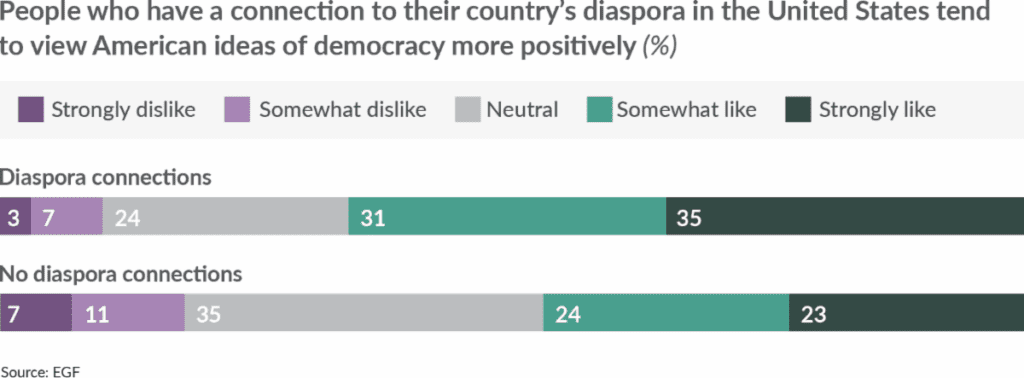Why This Matters: Cross-Border Reflections

Cross-Border Connections
By Allyn Summa, Executive Director
Democracy has come under strain around the world and in the United States. And as Washington seeks to revitalize democracy’s international appeal, knowing what contributes to positive perceptions could help.
Our fourth annual international survey, optimistically titled “Democracy’s Promise: International Views of America in the Biden Era,” surveyed people in nine countries to get a better idea of how the United States is viewed abroad. Our survey yields heartening data. Overall, favorable views of the United States and its democracy have increased and are at the highest point since we began conducting the survey.
But there is still room for self-reflection.
Immigration is one of the more hotly contested issues in the United States, and its debate reveals fundamental disagreements over America’s national identity. Overseas, support for American ideas of democracy could be connected to perceptions of US immigration policy. When asked to rank what would make American democracy more attractive, if “more immigrants and refugees were allowed to enter the United States” was one of the top three answer options.
Over the years, US immigration and visa policy has become intertwined with national security. Concerns with extremists and spies have been cited as reasons to keep immigrants, refugees, students, and others from entering the United States. But easily lost amid noisy debates over walls and troop deployments to the southern border are the potential national security benefits of cross-border connections.

Overall, survey participants with close friends or family living in America, or who have themselves lived or visited there, are more likely to view the United States and American democracy favorably. This trend is particularly pronounced in countries with some of the least favorable views of the United States, like Mexico—the focal point of America’s immigration debate—and China—where many students have been denied visas to study in the United States.
Whether for education, work, travel, or to embark on a new life, people who come to the United States are exposed not only to American ideals, government, and culture, but, also crucially, to the American people. Personal connections can break down cultural and national divides to create goodwill and reverence for the United States. As we wrote in our report, “[t]his sentiment gives foreign political leaders an incentive to work cooperatively with the US and adds a constraint on actions opposed to the US.”
Please drop me a note. What global issues do you think about?

Written by Allyn Summa
Allyn Summa is the executive director of the Institute for Global Affairs. Drop Allyn a note and let her know what global issues you think about.





